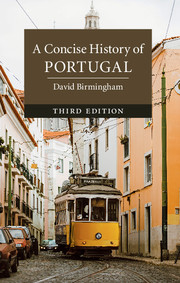Book contents
- Frontmatter
- Dedication
- Contents
- List of illustrations
- Preface to the third edition
- Map1
- Introduction
- Map2
- 1 Peoples, cultures and colonies
- 2 Rebellion and independence in the seventeenth century
- 3 The golden age and the earthquake in the eighteenth century
- 4 Brazilian independence and the Portuguese Revolution
- 5 The bourgeois monarchy and the republicans
- 6 The dictatorship and the African empire
- 7 Democracy and the European Community
- Afterword: entering the twenty-first century
- The houses of Avis, Beja and Habsburg
- The houses of Braganza and Braganza-Saxe-Coburg
- Republican presidents
- Select source materials
- Selected works published since 1990
- Further reading in English
- Index
3 - The golden age and the earthquake in the eighteenth century
Published online by Cambridge University Press: 28 March 2018
- Frontmatter
- Dedication
- Contents
- List of illustrations
- Preface to the third edition
- Map1
- Introduction
- Map2
- 1 Peoples, cultures and colonies
- 2 Rebellion and independence in the seventeenth century
- 3 The golden age and the earthquake in the eighteenth century
- 4 Brazilian independence and the Portuguese Revolution
- 5 The bourgeois monarchy and the republicans
- 6 The dictatorship and the African empire
- 7 Democracy and the European Community
- Afterword: entering the twenty-first century
- The houses of Avis, Beja and Habsburg
- The houses of Braganza and Braganza-Saxe-Coburg
- Republican presidents
- Select source materials
- Selected works published since 1990
- Further reading in English
- Index
Summary
The golden age of modern Portugal dawned with the eighteenth century. King Pedro lived on until 1706 to witness the first ten years of Brazilian mining prosperity but it was his successor John V who reigned over the great flowering of Portuguese art and culture. Architecture blossomed as it had done under the first colonial empire of King Manuel in the early sixteenth century. Royal palaces and noble manor houses mirrored the splendour which Spain had built from its Latin American mining revenues. A small cultured ´elite became conversant with the world of learning and built fine libraries. Diplomats and even members of the royal family travelled through Europe and acquired cosmopolitan tastes. Churches were lavished with gilded carvings and ornamental decoration. The aristocracy ostentatiously rode in carriages wearing their finest robes. But the wealth of the few was matched by the poverty of the many. Peasants lived in almost feudal conditions of dependency. Fine palaces were not reflected in improvements to domestic and rural housing. The flowering of aristocratic learning was not mirrored by any development of public education or popular literacy. The Portuguese church remained one of the most conservative in Catholic Europe and continued to stifle open enquiry. The economy remained tied to Britain in a way which inhibited the broadening of the industrial base. Subsistence and survival were the hallmark of popular experience throughout the ‘golden age’. Social and economic change did not begin to affect Portugal until the easy years of Brazilian gold were over and the great Lisbon earthquake of 1755 had destroyed the commercial heart of the metropolis.
Early eighteenth-century high society revolved around the palace on the great riverside square at Lisbon. Despite the political tensions which divided the crown and the nobility the royal apartments were crowded with supplicants and foreign visitors longed to be presented at court. Orders of precedence were regulated by the most stringent etiquette and the king became a remote and austere figure. The grandees usually numbered a few dukes, a dozen marquises and thirty-odd earls. Below them came the lesser nobility and thousands of impoverished knights of such militant orders of chivalry as the Order of Christ. Nobility of the blood was much prized but social mobility was possible and judges, generals and men of letters could acquire noble status.
- Type
- Chapter
- Information
- A Concise History of Portugal , pp. 67 - 98Publisher: Cambridge University PressPrint publication year: 2018

